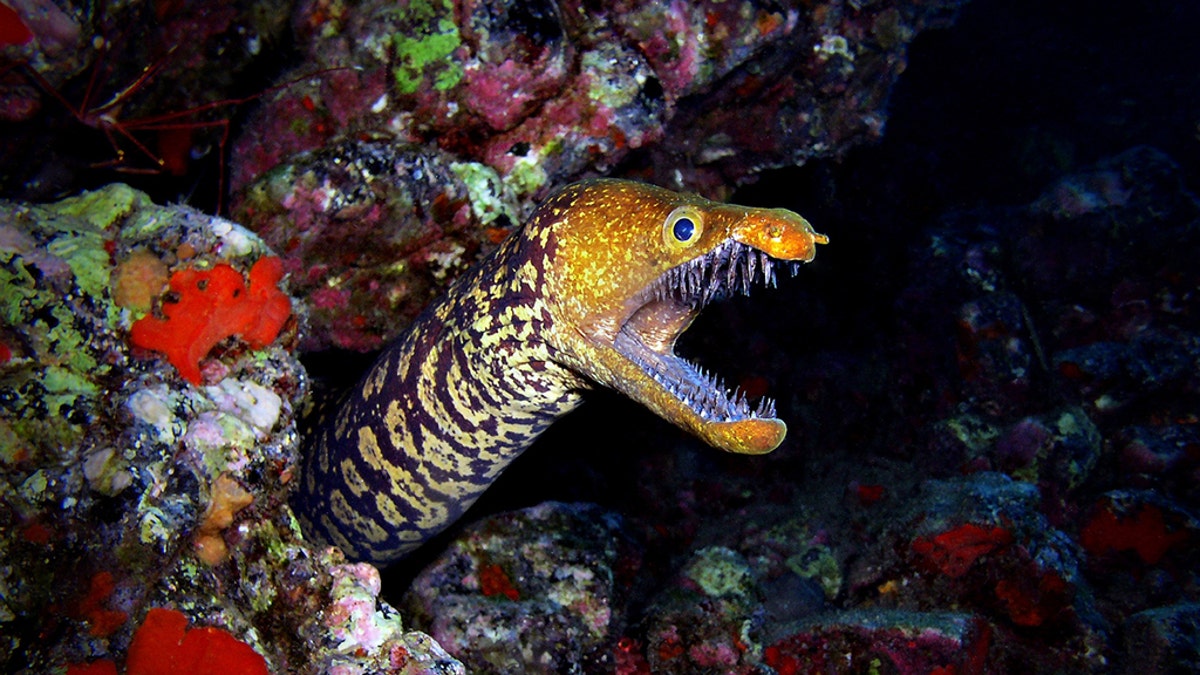
A Maryland woman was likely bitten by a moray eel off the coast of Hawaii on July 29, 2018. (iStock)
Kristen Porter was relaxing on a floatie at Kuhio Beach in Waikiki, Hawaii last week when she felt something sharp pierce her foot. Wincing in pain, Porter pulled her foot out of the water and saw a terrifying sight.
"I knew immediately that it was something bad, and it wasn't just like a fish nibble, so I pulled my foot into the air and there was blood everywhere," Porter, of Annapolis, Maryland, told KHON-TV on Thursday.
With help from her son and fellow beachgoers, Porter hobbled to shore to examine the mysterious wound. Once on land, a lifeguard observed several gashes on her foot, telling her the marks appeared to be consistent with an eel bite.
INDIANA WILDLIFE OFFICIALS CATCH 'PECULIAR' EEL-LIKE CREATURE IN LOCAL SWAMP
Porter initially thought it was a shark attack, though the International Shark File in Florida confirmed to KHON-TV days after the Sunday incident that wasn't the case.
Waikiki Aquarium director Andrew Rossiter, who examined photos of the injury, told KHON-TV he also believes it was an eel bite, though they're extremely rare — especially at Kuhio Beach, which isn't particularly rocky.
Rossiter determined the likely culprit was a moray eel, a snake-like fish that can reach up to a whopping 13 feet in length. Some moray eels can even weigh more than humans, the National Oceanic and Atmospheric Administration (NOAA) described in a blog post.
Some burrow underneath the sand while others hide among rocks. They have sharp, long teeth — a second set alllows them to more easily break down their prey, which they typically swallow whole.
"(They're) incredibly rapid and even a diver will tell you to stay away from them in the water because they can come out and ping you in the blink of an eye," Rossiter told the news station.
HUMPBACK WHALES LUNGE TOWARD CALIFORNIA TOUR BOAT IN SHOCKING VIDEO
Eel bites are rare. The sea creatures tend to stick to themselves, though it's possible they would strike if they feel threatened or someone invades their space. They're also more active at night than during swimming hours.
"[This bite] was definitely a case of mistaken identity, because the eel's teeth penetrate, so they literally pierce their prey and swallow their pray whole, so I doubt the eel was trying to swallow the lady whole," Rossiter said.
Porter, 51, was later taken to a nearby urgent care, where her wound was cleaned and wrapped up. A doctor recommended she go to the hospital for stitches, but she declined any further treatment, according to the Honolulu Star-Advertiser.
"So the mystery is solved. Turns out it was a 5-6 ft moray eel. If this doesn’t give me [nightmares]," Porter wrote on Facebook early Friday.